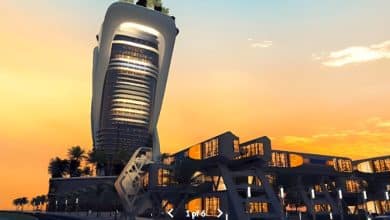The Insider Spotlight: Michelin Star chef and Kinara founder Vikas Khanna

Bringing you a sneak peak into the inner world of local and international resorts, restaurants, and industry players’ lives.
This month The Insider chats to Indian chef Vikas, known for hosting Master Chef India, his Michelin Star award, and his gem of a restaurant, Kinara, and more recently opened another restaurant in the same location called Ellora. The prominent chef, author, and television personality spent some time chatting to us about his motivations for cooking and his vision for his local culinary outlets.

- What was your earliest memory around food that was the catalyst for your becoming a chef, and tell us about your beginnings in the industry.
My journey began in my home kitchen when I was 16 years old. I remember many of my relatives inviting us to their events and asking why we couldn’t serve certain traditional Indian dishes like barfi or fudge. I had been making those dishes at home and knew Indian cooking quite well, so I started taking on little catering orders. I was self-taught, having learned from my grandmother. I eventually approached my father and told him that I wanted to start a catering business in the back of our house. He challenged me to earn ₹10,000 to buy the equipment myself. This was a tough task for a 17-year-old in a middle-class family in North India, where the concept of men cooking was not yet widely accepted. However, I embraced the challenge and earned the money by knitting sweaters for a school. We used the money to buy tables, chairs, pots, pans, a tandoor oven, and a big signboard. We set up the business in the back of our house, and that became the foundation for my entire career. If I had not earned that initial ₹10,000, I would not have had the drive to continue and turn it into a multimillion-dollar business. Looking back, I realise that my father was teaching me an important lesson about standing up and earning what you want, rather than simply demanding it.
- What is the inspiration behind Kinara, and how does it express your unique vision?
Kinara, like every restaurant I have created, is unique and unlike any other. It’s more like a warm and welcoming extension of someone’s personal dining room, where guests feel like they are part of the family. Our aim is to create an atmosphere that is cosy and inviting, and where guests can experience comfort food with a twist. We take traditional dishes and elevate them by adding unique taste and texture profiles. From the very first meeting with the JA team about this restaurant project, we knew that we had to create something special that could last. We want guests to feel like they are part of the Kinara family, not just customers at a restaurant.
3. What is your ultimate career goal?
My ultimate career goal is to complete my new project in New York that combines a restaurant and a cultural centre for India. This will be one of the biggest challenges I take on in my life, and even after completing it, I will continue to work hard and feel proud of my accomplishments. I want to use my voice in the Western world to connect with the East and give a platform to artists, singers, performers, and chefs. My goal is to leave a legacy that inspires others and brings people together through food and culture.
4. What would you like to see more of in Dubai’s culinary scene?
You need more in Dubai’s culinary scene? Every month, you have big chefs, restaurants, and everything else opening. Dubai has become the centre of attention, especially for me as this is my second restaurant here. I opened Junoon at La Shangri Lao in 2013-2014, and even back then, we faced issues with produce. We were constantly questioning whether certain items would be available, if we should change the menu, or if we should provide alternatives. But that’s not the case anymore. In fact, some of the produce here is better than the same produce in their countries of origin due to the premium market. The transformation of Dubai over the last few decades is truly remarkable, and it has become a gravity for many chefs, entrepreneurs, and artists to come to the Middle East. It provides a platform between the East and the West.
5. What do you do in your spare time?
I don’t have spare time because I am constantly creating. I write, make movies, and produce documentaries. I have even created a big museum. Travel is also essential for me, as it provides valuable learning opportunities. I hope to maintain this curiosity throughout my life, because I am not the type of person who says, ‘I’m almost done.’ I’m either working or finished. I will continue to work until the very end, and then I’ll announce that I’m done and move on to creating new art. Until then, I feel that I should always be learning and staying at the top of my game. Just yesterday, Ashish and I were sitting late at the table, researching new equipment to enhance the taste of our food, change its shapes, and add more to it. For me, adding more is crucial because it takes the experience one step further, beyond what the guest is ordering, and creates an unforgettable experience.






